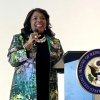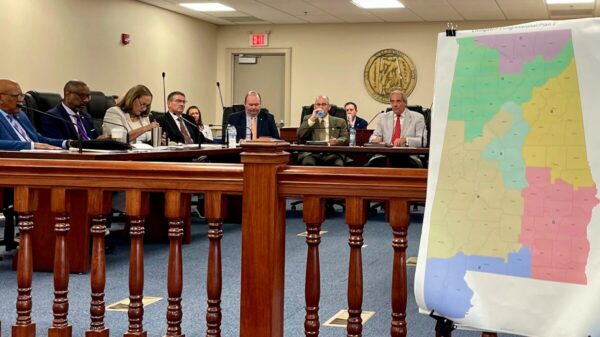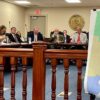Representatives of several different nonpartisan voting rights groups joined together at St. John’s A.M.E. Church Tuesday to voice opposition to a bill that would criminalize the acceptance of private funding for election administration.
Rep. Wes Allen, R-Troy, brought HB194 in response to a series of grants funded by Facebook CEO Mark Zuckerberg that were dispersed to election offices during the 2020 elections.
“Elections should not be run by private entities or by public-private partnerships,” Allen said. “Doing so damages the integrity of the election process and calls into question our elections themselves.”
Kathy Jones, president of the League of Women Voters of Alabama, said the concern is that the bill also bans public election officials from accepting “personal services from an individual or nongovernmental entity for the purpose of funding election-related expenses or voter education, voter outreach, or voter registration programs.”
“In the strictest term, in the strictest interpretation, you could say, well, we can’t sit with an elected official and help them…” Jones said. “But what we’ve also experienced is when you start putting language in a bill, in the law, that makes it seems like there could be that you could be committing a misdemeanor or a crime … then you’re going to start seeing a chilling effect.”
Although Allen has pointed to Zuckerberg’s grants as the example for why the bill is necessary, Jones told listeners that Allen’s bill and others like it across the country are a response to quell an increase in voter participation.
“During the midst of a pandemic, we had record voter turnout, we had record absentee voting, all with no voter fraud,” Jones said. “Instead of celebrating this accomplishment, some of our state legislators are actually seeking new and more restrictive and unfair voting laws and election laws, which have no merit and their only purpose is to make the voting experience more complicated and confusing than ever, and establishing criminal penalties for Alabamians who are only wanting to help others engage in the election process.”
Scott Douglas, executive director of Greater Birmingham Ministries, said the bill is a continuation of the “big lie” that the 2020 election was stolen through voter fraud.
“It’s intentionally obtuse, it’s intentionally loose and intentionally vague, but it’s real goal is making expanding the practice of democracy intentionally difficult and intentionally arbitrary,” Douglas said.
JaTaune Bosby, executive director of the ACLU of Alabama, called the bill a “direct attack on grassroots organizations” and that “bills like this perpetuate issues of white supremacy and discrimination.”
Many of the speakers tied the bill into the fight for voting rights, but did not specifically address how the legislation would impact their programs.
In 2020, all seven counties in Alabama that received “Zuckerbucks” funding were won by Joe Biden. However, it appears those are the only counties which applied for the grants, which were open to all requesting counties.
The bill is still awaiting a vote on the House floor and would then need to travel through the Senate. There are 10 days remaining in the legislative session.























































